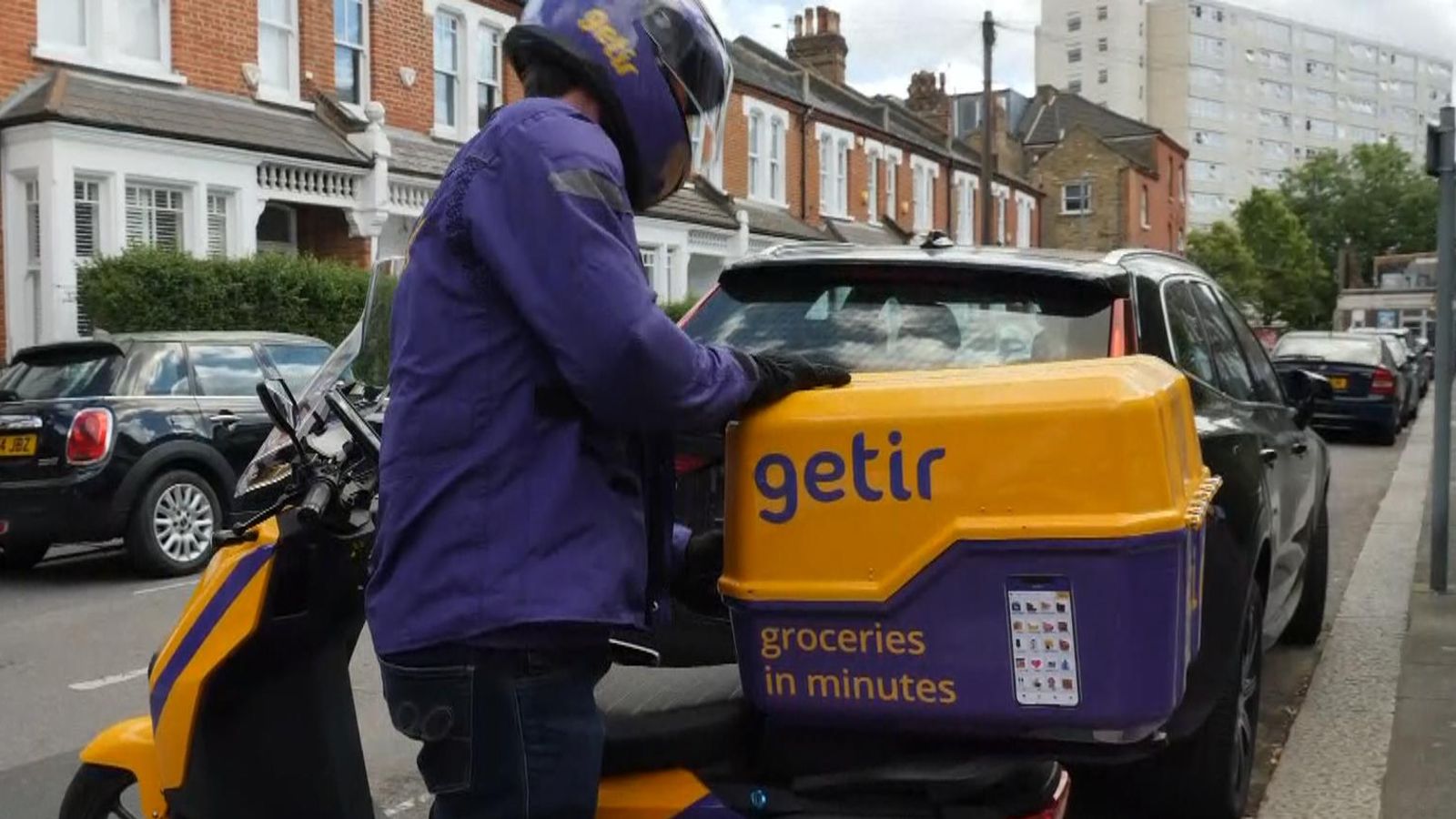How much are you willing to pay never to run out of milk again? Or bread? Or beer?
In a supply room stuffed with brand-name groceries a few pedal strokes from Battersea Park in London, product pickers and a constant flow of delivery drivers are trying to find the answer.
They work for Getir, a Turkish rapid delivery company that launched in the UK earlier this year with a striking promise: to transport groceries to customers within ten minutes of orders being placed on their app.
Their target market is anyone who wants to avoid going out to shop, whether to satisfy a millennial whim for a short-notice barbecue, or a parent’s desperate need for nappies and Nurofen.
To make it work, Getir has 28 of these so-called “dark stores” – effectively convenience stores without the customer-facing elements – which they say brings 45% of Londoners within reach.
Making the deliveries are hundreds of riders, all directly employed and earning the London living wage, using a fleet of electric mopeds and bicycles.
Getir is part of the booming gig economy that’s changing the culture of consumption, but wants to avoid the allegations of poor employment practices and environmental harm that has dogged other entrants.
And it is not alone.
Accelerated in part by the pandemic, the last year has seen fierce competition for the ultra-convenience delivery market in the UK and around the world, with a fleet of start-ups almost exhausting the available lexicon of monikers.
Flink, Gorillas, Gopuff, Weezy, Dija, Jiffy, Fancy and Snappy are just some of those offering smartphone access to rapid-delivery services in the UK, US and Europe, and between them they have attracted huge interest from investors looking for the next big thing.
Analysts Pitchfork estimate around $14bn has been poured into these services since the turn of the year, fuelling free deliveries and discounting in the race to attract customers and hang on to them.
Earlier this month Getir said it had raised $550m in a funding round that valued the six year-old company at $7.5bn, 50% more than Morrisons, the 122-year-old supermarket chain.
This rush of venture capital has forced the supermarkets onto their bikes too.
Tesco is trialling its one-hour delivery service Whoosh in Wolverhampton and London; Ocado Zoom offers a full weekly shop in an hour; while Aldi and Co-Op are available on Deliveroo.
All are chasing market dominance that will leave them as the recognised brand, so synonymous with the service they provide that it becomes a verb.
Getir believe they will succeed because they were first to show the model can work.
“We invented this model six years ago,” says UK General Manager Turancan Salur.
“We initially started in Istanbul, at the moment we operate in 30 cities in Turkey and some of our more mature dark stores are actually turning a profit,.
“We see that this is a viable business model and the reason for that is, when you deliver to the customer very fast, you provide convenience that really can’t be had elsewhere.
“So if you want to treat yourself to a chocolate bar or an ice cold beer, or whether you need nappies or you just ran out of something at home, someone that is able to deliver you that in minutes, that’s a service that is really valuable.”
Mr Salur dismisses the suggestion that Getir and services like it are nurturing a digital divide in consumption, the every need of affluent city dwellers serviced by an army of workers reduced to low-wage delivery drones.
“As our founder said, we are democratising the right to laziness, and actually the prices we’re charging are basically the same price you would find in a Tesco Express or a Sainsbury’s Local, so it’s not just something for the affluent, it’s a service for the masses.
“And we want to service the masses. We realise every person’s time is quite valuable.”
While Getir’s ten-minute pledge is headline grabbing, other entrants to the market think anything under an hour will be enough to count as “rapid”, and persuade consumers to pay a premium for delivery once the investor cash runs out.
Justin King, the former chief executive of Sainsbury’s, is an investor and advisor to Snappy Shopper, which delivers from the UK’s existing network of 40,000 corner shops, until now the last word in convenience, and is close to completing a funding round of its own.
“I’ve always believed that real shops would be part of the solution as more and more of the world went online for orders,” he told Sky News.
“Some of the best distribution assets in this country are our local corner shops.
“They have been developed over many years, usually by their owners because they’re largely independent and they know their customer base, but developing the technology to do home delivery would clearly be beyond the vast majority of them.”
Mr King says the rush of money into the sector follows a familiar gig economy pattern.
“As the technology gets better and slicker, and people think through how you can solve the problem of ever-shorter delivery times, it then becomes a foot race about who wins.
“Brands like Just Eat and Deliveroo were in a very crowded space when they started out but they were the winners, and the winner takes the spoils.
“We’re seeing a similar thing in rapid delivery of groceries where lots of people are trying to be the winner and that’s attracted a lot of venture capital.”
If redefining the notion of convenience from a trip to the corner shop to going no further than the front door sits uncomfortably with some consumers – the vast majority of whom still shop in-person – a generational shift means the rapid delivery market is here to stay.
Catherine Shuttleworth of Savvy Marketing, whose clients include supermarkets considering rapid delivery, says younger consumers need no convincing of the benefits of smartphone shopping.
“We’ve got a whole generation of consumers who have lived in a world of the internet, where they are used to being able to get things fairly quickly, ask for them and they’re delivered,” she says.
“And that’s really been extended to the way that they buy their food and drink.”
For now rapid delivery is an urban phenomenon, but as more established retailers enter the market, and consumers tolerate the delivery window stretching to an hour, it could soon be coming to a town near you. Quickly.






















